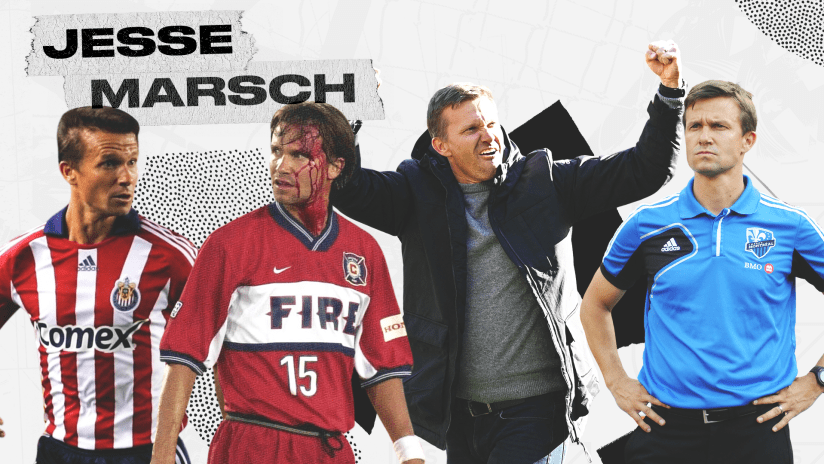The making of Jesse Marsch in MLS predates the league’s inception. It goes back to when he was in college.
Marsch, a boy from a small Wisconsin city called Racine, was recruited to play soccer at Princeton University under head coach Bob Bradley, among the country’s most decorated male soccer coaching minds and someone who would become a trailblazer. He’d spend the better part of the next quarter-century with Bradley – from Princeton to D.C. United, then Chicago Fire FC and Chivas USA before getting his first coaching job as an assistant under Bradley with the US men’s national team.
Along the way, Marsch learned and developed his own ideas, made his own connections and a ton of his own memories, as a hugely successful MLS player and then a Supporters’ Shield-winning head coach with the New York Red Bulls. From there, he embarked on a coaching career in Europe with RB Salzburg and RB Leipzig.
Now at Leeds United, Marsch follows a path first forged by Bradley, who was the first American-born head coach of a Premier League team when he (briefly) was in charge at Swansea City. Marsch inherited a sinking ship at Leeds but has steered it immediately, doing things his way and leading the group away from the relegation zone. They are currently on a four-game unbeaten run after a commanding 3-0 win over Watford last weekend.
MLSsoccer.com spoke with a number of folks who knew Marsch best at various stops in MLS, from his playing days to his first coaching job with the Montréal Impact (now CF Montréal) and then becoming a household name with the New York Red Bulls.
Chicago Fire competitiveness and scuffles
Jesse Marsch’s professional career began with D.C. United during MLS’s inaugural 1996 season, but he made his name in Chicago with the Fire. Bob Bradley was an assistant under Bruce Arena at D.C. United for the league’s first two seasons, then was named head coach of Chicago for their expansion season in 1998. He brought Marsch there.
Marsch would go on to make 200 appearances for the Fire, in an atmosphere that suited his fiery, competitive nature.
“We got under each other’s skin,” Philadelphia Union head coach Jim Curtin said. Curtin joined the Fire in 2001, where he was Marsch’s teammate until 2005, then again in 2008-09 with Chivas USA. “There were fistfights all the time, that was a common occurrence. Jesse had a way of competing, it wasn’t uncommon that punches were thrown. Let’s just say we’ll leave out some details, but, yeah, that wasn’t uncommon.”
Austin FC head coach Josh Wolff, a fellow original member of the Fire with Marsch and his first roommate, recalled those details, including a one-punch knockout by Ante Razov.
“Yeah, plenty of good stories,” Wolff said. Wolff played for Chicago from 1998-2002. “Jesse got knocked out by Ante in training in one punch; He got thrown out of a training because he took a cheap shot. There was plenty of animosity between players. Jesse didn’t back down, other players didn’t back down either.”
Training altercations were left between the white lines of the pitch, quickly forgotten and moved on from in that ultra-competitive group. In fact, the morning after that fight with Razov and Marsch, the pair were in the same car heading to training together.
“In hindsight, it was a good thing,” Curtin said. “It made us all so competitive, it was a really cool locker room to be part of.”
It was like that from Curtin’s first day.
Curtin arrived with the team in 2001 fresh out of college, after the Fire’s three-year run of two US Open Cup titles and one MLS Cup. It was a bit of a jump in quality and pace for the former Villanova star, and his first training session didn’t quite go to plan.
“You get thrown off a plane off that, and you might be a good college player, but you learn pretty quickly you’re not at their level,” Curtin said. “And it was probably the beers I had the night before, but I timed a challenge – let’s just say very poorly – on Piotr Nowak. It was so bad, Bob ended the session. I walked away with Jesse, sat in the van and I turned to him – and I didn’t know Jesse at all – and said, ‘Well, at least I can say I fouled Piotr Novak before my career ended.’ I’m thinking that was the end of things. He laughed and appreciated I was self-deprecating, and a friendship was born from that.”
Curtin and Marsch carpooled together during their time in Chicago and Chivas. They remain close to this day, with a lifetime of memories on and off the field.
“Thank god there were no cell phones in those days,” Curtin said with a laugh.
Marsch remained that way through the twilight of his career. It’s just who he is; you can’t really turn that off.
From Chicago he went to Chivas USA, as did Curtin, where they played with rising rookie Sacha Kljestan. Kljestan was taken fifth overall at the 2006 MLS SuperDraft, was a finalist for 2006 MLS Rookie of the Year and would be destined for a successful career in MLS, Europe and with the USMNT. His first stop was as Marsch’s midfield partner with Chivas.
“I’d say for the majority of my rookie year, I didn’t really like Jesse that much,” Kljestan said. “He was always on me. He was the old guy who had been around the block and I was the rookie who thought I knew better.”
The pair spent four years playing together, with Kljestan crediting Marsch for aiding his development.
Kljestan would go on to Anderlecht, becoming a fan favorite as an integral part of Belgian league-winning sides, then join up with Marsch as a centerpiece of those New York Red Bulls teams he coached.
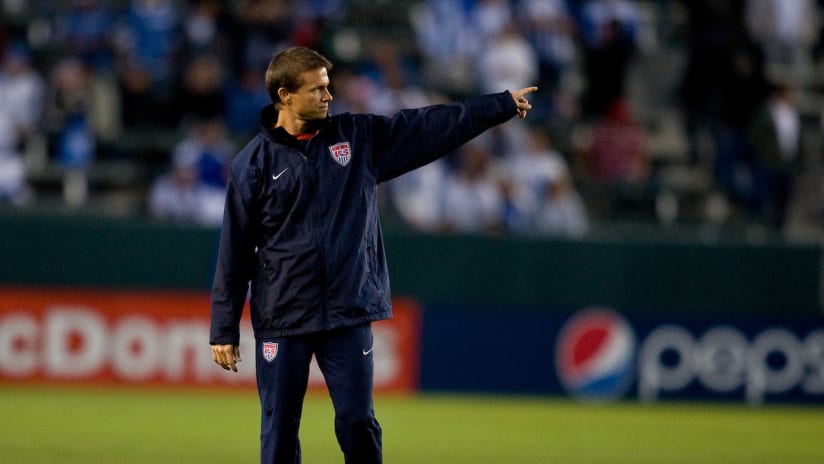
Bob Bradley’s impact
To say that Bob Bradley's coaching tree was plentiful, particularly in those Chicago days, might be an understatement. In different variations of that team with Marsch a centerpiece – including after Bradley had departed – the culture he laid lived on. It was a perfect breeding ground for future coaches and sporting executives.
Bradley was at the helm, regarded as one of the best American coaches of all time, and has since cycled through the USMNT, Egypt men's national team, Swansea, LAFC and now Toronto FC. Denis Hamlett was an assistant on that staff and he’s now the sporting director at the New York Red Bulls.
The playing rosters featured:
- Current MLS head coaches Curtin and Wolff
- Former MLS head coach and current Manchester United assistant coach Chris Armas
- Current MLS assistant coaches Razov, CJ Brown, Frank Klopas and Zach Thornton
- Current MLS front-office executives John Thorrington, Carlos Bocanegra and Amos McGee
- Former MLS manager Piotr Nowak
- Former Bulgaria international manager (and Barcelona star) Hristo Stoichkov
“The film session arguments, sharing of information,” Curtin said. “I’m 21 years old, my head is spinning in this locker room with Bob, Stoichkov, Piotr, Jesse and Chris all disagreeing and giving points of view. You couldn’t help but learn. I was lucky to be in that environment.”
“Landing in Chicago was very instrumental in my development,” Wolff added. “Those were good players and every player held each other accountable. That’s Bob as well. Nobody got away with anything, the competing was real. There were plenty of scrappy days, the feistiness. It was a very connected group. Bob Bradley’s ability to keep connecting to players and families, to keep them together, I take away those things from that group.”
Given how long Marsch spent with Bradley from college through the pros and even his first coaching job as an assistant with the national team, it’s easy to lump them together, particularly now with Marsch at Leeds six years after Bradley went to Swansea.
“They share ideas, no question. But the great thing about soccer, you can learn from the best and evolve with your own ideas,” Curtin said. “They’re their own people, they’re both appreciative of each other and both incredible at what they do. As someone who learned from both of them and owes a career to both of them, I can step back and say they’re different, and that’s okay. Both are incredible leaders. Maybe the best way to put it, they’re both incredibly brave and didn’t stay in their comfort zone. Bob took Egypt, Bob took Swansea. Jesse, same thing. He’s coached all over the world and has had success. They both find ways to win because they’re both winners.”
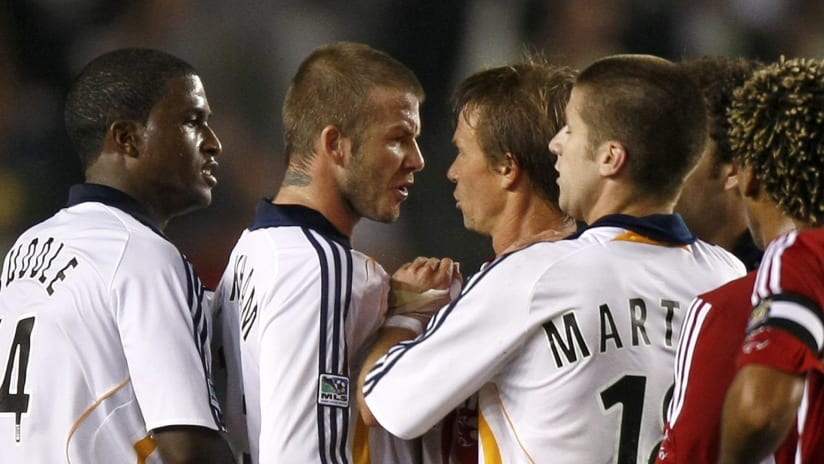
Playing against Marsch? “A lot of whining, pissing and moaning”
Between D.C. and Chicago, Marsch won nine major trophies in the league’s first eight seasons: Three MLS Cups, two Supporters’ Shields and four US Open Cups. His teams won, simply put.
A tenacious defensive midfielder, Marsch was no stranger to contact, the type of player all successful teams need. He committed 450 fouls over his career and picked up 57 yellow cards.
“When you talk to people about Jesse outside of his teammates, they say ‘I hated him on the field,’” Curtin said. “No kidding, because his teams always won!”
Wolff spent five seasons with Marsch and the Fire before being traded to the Kansas City Wizards (now Sporting Kansas City). He got Marsch as a teammate, then had extensive experience playing against him for the better part of the next seven years, too.
“A lot of whining, a lot of pissing and moaning,” Wolff said with a laugh about playing against Marsch. “But again, there are these players who want to antagonize. … When he did something well he let everybody and anybody who could hear him know. This is Jesse, you see it, it’s right on his sleeve every single day. It’d be a boring world if we didn’t have personalities.”
Marsch didn’t win any trophies in the final act of his career at Chivas USA, but the correlation between the club being competitive and not with or without him is remarkable.
Chivas missed the playoffs in 2005, their inaugural season. Marsch joined ahead of 2006 and the club made the playoffs each of those four years from 2006-09. He retired after the 2009 season. From 2010 until the club’s final season in 2014 before ceasing operations, Chivas missed the playoffs each year.
Kljestan departed the club during the 2010 season, signing for Anderlecht. Marsch’s impact on the way he trained every day stayed with him throughout his career, still thriving with the LA Galaxy today.
“When you saw Jesse train, he wasn’t the best player but his team always won,” Kljestan said. “He always had the guys ready to play. I took a lot of that with me when I went and played with him at Red Bulls.”
Off the field, "the most humble, down-to-earth, family guy"
While Marsch wears his heart on his sleeve both as a player and coach, he’s a different human outside of the game. Most people are, anyway.
“Of course he was a different person off the field,” Curtin said. “He’s the most humble, down-to-earth, family guy from Wisconsin. He’s a great person, his mom and dad are amazing people. There’s no coincidence he’s developed into this leader.”
“He’s fun off the field. We’re all self-deprecating and take shots at ourselves – he’s as open as anyone,” Wolff said. “He’s a good dude, a smart guy. He’s comfortable being uncomfortable, you’ve seen that over his career. He and his family have done things to experience life, that’s an incredible quality.”
Marsch coached in the United States, Canada, Austria, Germany and now England. In the years between Montréal and the Red Bulls, he took his kids out of school so he and his family could go on a six-month trip around the world to experience the globe's different cultures together.
Most people wouldn't take that sort of leap.
“To have a beer with Jesse, he’s one of the best storytellers,” Curtin said. “He makes everyone feel welcome. I’ve had many nights where you’re just laughing. I got to see the other side of Jesse. He’s very serious about his soccer, but he’s a down-to-earth guy.
“He’s actually hilarious, but don’t tell him I said that part,” Curtin continued. “Well, he can get repetitive with his stories, you can write that. He has five or six amazing ones where he’s like a world-class storyteller, but I’ve heard them a lot. His wife will back me up on this. I say that in the nicest way.”
“You know all coaches, they think they’re funny. He’s got a few terrible jokes,” Bradley Wright-Phillips said. Wright-Phillips was the star forward for the New York Red Bulls during Marsch's entire tenure. “But, nah man, I honestly don’t have a bad word to say about Jesse. He was quality, especially for me.”
When Kljestan joined the Red Bulls in 2015, as pushed and orchestrated by Marsch, Kljestan played one more game with Anderlecht on a Tuesday night as a sendoff to a successful run at the club whose fans affectionately called “Mr. USA”. He took an overnight flight to New Jersey to complete his medical, then at the end of the day hopped on another plane to Florida to join up with his new teammates in preseason camp.
In the middle of the night, as Kljestan stumbles into the hotel in a jetlagged fog, he sees a familiar, smiling face.
“I got into the hotel at like 1 in the morning and Jesse is just standing in the lobby waiting for me to give me a big hug,” Kljestan said. “That meant a lot to me. It made me feel so welcomed to the group.”
"Lived and learned" in a season with the Montréal Impact
It’s easy to forget Jesse Marsch’s one year as manager of CF Montréal, then still known as the Impact. It was his first foray as a head coach.
Montréal were set to begin play in MLS in 2012. Canadian international Patrice Bernier, who began his career in 2000 with Montréal when they played in the A-League, was enjoying a successful period in Europe, currently in Denmark.
Marsch helped convince him to come home for his hometown’s inaugural season in MLS.
“I had no plans of coming back to Montréal already when the team was announced,” Bernier said. “Then Jesse came to Europe to watch players and wanted to see me. He was able to convey his philosophy and guided me to say, okay, I might come back home. He was a guy who had ideas, wanted to bring his flavor to MLS. That message conveyed.”
Bernier played for Montréal until retirement following the 2017 season. He is second all-time in MLS matches played in the club’s history.
“Jesse is someone who works hard,” Bernier said. “Even though me and him had our rough patches, he always communicated. Some coaches when you’re out of the mix, you never talk. He was at least honest. He took a decision, you might not like it, but the communication line was always open.”
Marsch lasted just the 2012 season with Montréal before moving on due to “differences in coaching philosophies with management.”
“When he was at Montréal, he lived and learned,” Wolff said. “He got a new pathway, got introduced in different ways. He was comfortable knowing he needs to learn. It’s a life of learning until the day you die and he knows that.”
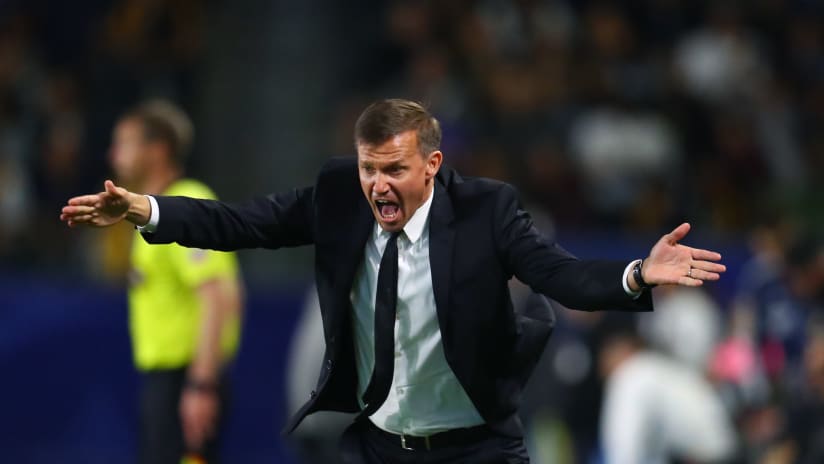
"This guy is f---king crazy": Marsch's RBNY revolution
Jesse Marsch became a national name while with the New York Red Bulls from 2015-18. Expectations were low at the onset. In fact, things were hostile.
The Red Bulls were transitioning out of the Thierry Henry era with a plan to revamp the playing and recruitment styles. Mike Petke, a former player with RBNY and then their head coach, was a fan favorite and enjoyed success at the club. He was surprisingly let go in favor of Marsch that offseason.
Leaders at RBNY held a town hall for fans to voice their opinions in that first offseason and it went very poorly. The fan base was still firmly behind Petke and angry at how things played out. Marsch was there fielding questions and angry comments, taking the criticism and ill-will in stride, saying he loved the passion.
Though preseason was rocky, it didn’t take long for Marsch to win them over.
“That first game at home we played D.C. United,” Kljestan said. “I remember the fans were not happy. They did a thing where they weren’t going to cheer in the first half. But Bradley scored two goals and they started cheering again. Winning is all that matters, and we won a lot, so the fans came around very quickly.”
They did it with the now-standard Red Bull high-pressing way. While it’s a hugely popular system today, it wasn’t quite so normal around the globe and that rang true for MLS.
The players were in for a shock that preseason.
“That was tough, that was crazy, oh my god,” Wright-Phillips said. “We’re out in Florida (for preseason), even just the warmup was so difficult. I was like what the hell, I’m not the fittest guy. If you’re asking me to run at training, I’m going to struggle. It was tough, man. I remember Roy Miller looking at me like what the hell is going on. The first week of preseason was tough.”
Kljestan missed that first week of preseason as he was still playing for Anderlecht and finalizing his transfer to RBNY. The first morning at the hotel, after arriving at 1 a.m. the night before, he’s having breakfast. Marsch comes over to start to familiarize Kljestan with the tactics.
“I’m still all jetlagged, but at breakfast he pulls me over and he’s drawing on a piece of paper how we’re going to play and how we’re going to press,” Kljestan said. “He’s explaining it to me, how our outside backs will press their outside backs. No one ever pressed that way. I was like: ‘This guy is f--king crazy.’”
Kljestan didn't mind that Marsch saw him as a No. 10 after he played mostly as a box-to-box midfielder with Anderlecht. Wright-Phillips didn't mind that a lot of the transition tactics had the players looking quickly for "Option A" when possession was recovered. Wright-Phillips was "Option A".
“He told us we were going to be the fittest team. I was thinking: ‘Me? I think you got the wrong guy, man,’” Wright-Phillips said. “He had to teach us the style in the beginning, it was like Pressing for Dummies.”
“If this doesn’t work, we’re going to be bad,” Kljestan said.
It did work out, for the team and most individuals. Wright-Phillips and Kljestan were two of the three finalists for the 2016 Landon Donovan MLS MVP award. Kljestan had 16g/51a in his three seasons under Marsch, BWP had 78g/21a in four seasons under Marsch (well, technically three-and-a-half seasons).
In Marsch’s first year in charge, 2015, the Red Bulls won the Supporters’ Shield and he was named Sigi Schmid MLS Coach of the Year.
“When he went over to the Red Bulls, I joke, but it was like the Montréal Impact 2.0 for Jesse Marsch,” Bernier said. “He had a younger team, he had clearer ideas from what worked and what didn’t in Montréal. He had his convictions. I’m sure they didn’t change, but he took an approach to the Red Bulls that worked so well. It was not a surprise the success he got.”
Meanwhile, Marsch’s former teammates and friends were embarking on their own coaching careers. Wolff was an assistant under Gregg Berhalter at the Columbus Crew, Razov an assistant under Sigi Schmid in Seattle and Curtin the head coach of his hometown Philadelphia Union, to name a few.
“It was strange coaching against him,” Curtin said. “You look across the sidelines, there’s Chris Armas, who you had a great relationship with too, and there’s Jesse. There’s always something extra in those games, you want to do well against your peers. You care about what they think of your team. It was like when we were players, we wanted to win every day in training sessions against each other. That’s normal. Afterward, we’d have a drink and joke about the old times, tell the same 10 stories, and we’ll laugh.”
The Red Bulls never did win MLS Cup during Marsch’s reign, though they were probably the best team in the league over that period.
“Jesse is my favorite manager I had,” Wright-Phillips said. “I had coaches who liked me, but I never had a manager before him who taught me how to play well. Just the way he spoke to me, even the first phone call. He told me he wanted me to be a leader, but I wasn’t that kind of person, I’m more of a soldier. Tell me what to do and I’ll get it done. He said no, you have to change that. That responsibility really helped me.”
The Red Bulls won another Supporters’ Shield in 2018, the year Marsch left midseason for Germany's RB Leipzig. Armas – Marsch’s former teammate and assistant coach – took the team the rest of the way, though stalwarts from the previous Shield-winning team like Kljestan and Dax McCarty had already left the club. Those exits, and lack of MLS Cup silverware, are the only real blemishes to Marsch’s time with the Red Bulls.
McCarty has publicly said he didn’t love how Marsch handled his exit after the 2016 season, while Kljestan said he felt shocked at his departure after 2017 as well.
“I know Dax went through the same thing,” Kljestan said. “It’s been no secret what’s happened with bigger players at the Red Bulls over the years, like Bradley going to play elsewhere is just sh*y to see. Luis Robles, Sean Davis. It is what it is, the Red Bulls have their way.”
“It was tough, it was the Red Bulls putting in place their vision,” Wright-Phillips said. “We know they want to go younger. But to hear you’re getting traded by someone you respected and played every week, it’s not easy to take. I understand their frustration, it happened to me too a couple years later.”
Marsch moved on during 2018, taking a leap of faith to move midseason from head coach of the Red Bulls to become assistant at RB Leipzig. A year later, he was named manager of Austria's RB Salzburg, where he enjoyed tremendous success both domestically and in European competitions.
That success gave him a chance with Leipzig last summer, but he didn’t last long as Marsch was gone from that job by December. He didn’t have to wait long for Leeds to come calling.
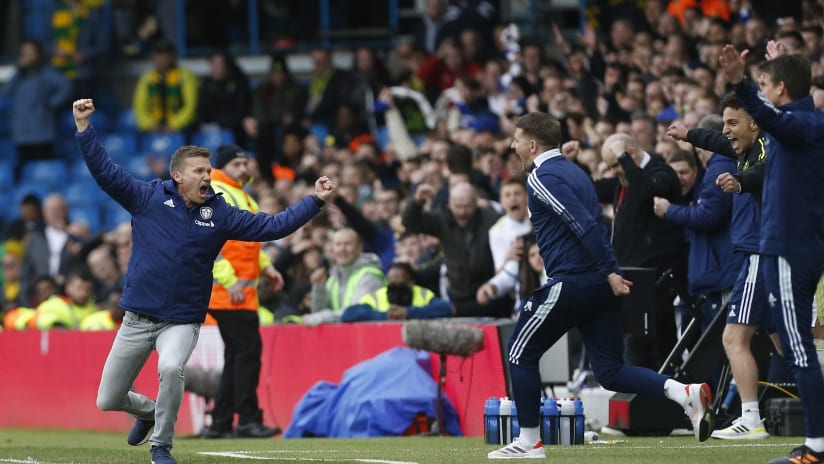
Handling pressure, breaking American stereotypes at Leeds
Marsch has had a few viral moments at press conferences since taking over at Leeds, dealing with the infamous English media that is dubious of Americans. He’s only the third American manager in the Premier League (Bradley at Swansea, David Wagner at Huddersfield Town) and only the second to have made his name in MLS following Bradley.
Bradley lasted at Swansea City for less than two months.
“They are unfairly tough on Americans, they disrespect MLS a bit,” said Wright-Phillips, an Englishman himself. “It just takes time. They’re going to have their little jokes. But me knowing Jesse, I don’t think it bothers him very much. If they’re going to try to wind him, they’ve got to be prepared to take what comes back.”
Marsch grappled with jokes about his American accent and "Ted Lasso" references, the Jason Sudeikis-led show about an American college football head coach taking charge of a Premier League team. He also took a shot back at the media.
“Knowing Jesse like I do, I know that laugh that he did,” Curtin said. “He took time to eyeball certain guys in the room. He commands respect because he deserves respect.”
It seemed like a press conference version of a late challenge that might result in one of his 57 career yellow cards or spark one of those training ground altercations in Chicago.
Marsch has currently got Leeds flying, moving further away from the relegation zone with each passing match.
"Jesse Marsch is a winner... and always will be."
Marsch took over at Leeds following the hugely respected Marcelo Bielsa, the Argentine manager who brought Leeds back to the Premier League and is a coaching icon. Stepping in for that type of figure in the middle of a season, with the team hemorrhaging results and staring down relegation, isn’t quite the ideal job to take over.
“You know with Jesse, he’ll do it his way and a way the players embrace,” Curtin said. “You’ve seen that already, they fight to the very last second for him. I’m not surprised. It’s not surprising he’s found ways to get results even with a team that was struggling.”
Leeds have pulled nine points clear of the relegation zone at time of writing, with six matches left to play. The teams behind them have two games in hand, though, so they’re not out of the wood just yet.
But three wins and a draw from their last four games have given them ample and unexpected breathing room. A big part of their squad is former NYCFC winger Jack Harrison.
“You can see his players will fight for him,” Wolff said. “That’s a real good starting point.”
Anything can happen in the last six games; Leeds still have to face powerhouses Manchester City, Chelsea and Arsenal in succession. But Marsch is already turning heads and proving naysayers wrong about his decision to take the gig and Leeds’ decision to entrust their top-flight survival to an American from a small city in Wisconsin.
“I can say with confidence: Leeds fans should know they’re in the hands of someone who wants nothing more than to win,” Curtin said. “He wants nothing more than to improve the players. I have no doubt he can keep them up and I have full confidence he’ll do it. The biggest compliment I can give is that Jesse Marsch is a winner, he has been from day one, and always will be.”

